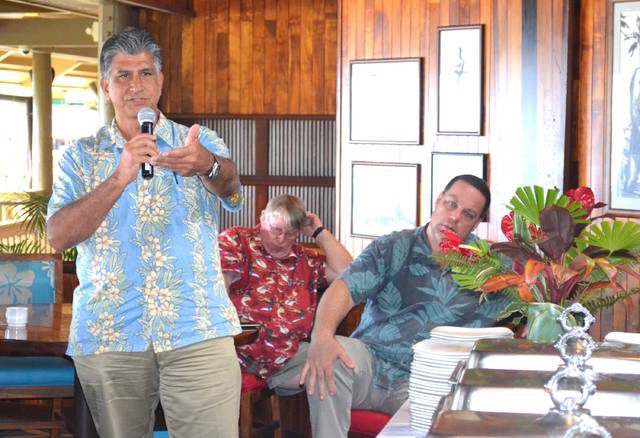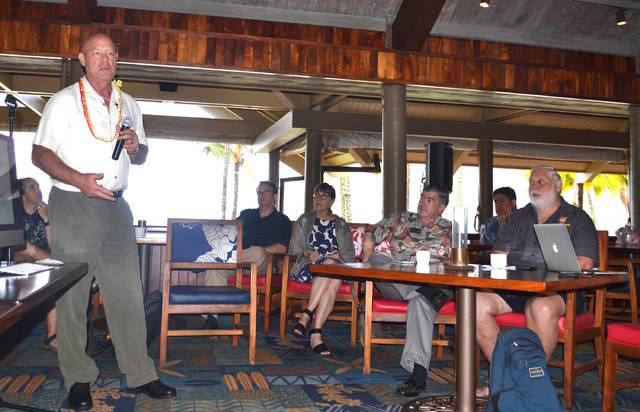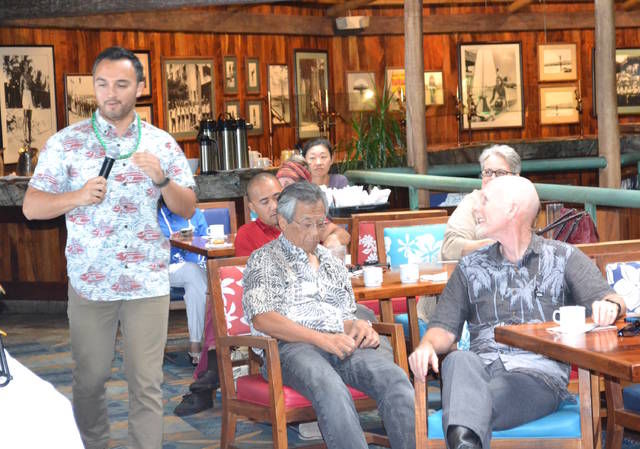LIHUE — Fairness continues to be the ongoing dilemma between the island’s taxi industry and two popular ride-sharing tech companies that recently began services. The changing world of transportation services on Kauai was debated at the Lihue Business Association program
LIHUE — Fairness continues to be the ongoing dilemma between the island’s taxi industry and two popular ride-sharing tech companies that recently began services.
The changing world of transportation services on Kauai was debated at the Lihue Business Association program Thursday. Councilman Derek Kawakami told a crowd of over 40 people the challenge is addressing technology, evolution and progress.
Leveling the playing field, he said, is part of that discussion.
“There’s two ways we can do it: We can regulate ride-sharing companies or we can move to deregulate taxi companies,” he said. “A lot of our ordinances are outdated. That’s why from time to time we go back and update our county code.”
Critics of Uber and Lyft say ride-sharing companies ought to pay the same fees and follow the county ordinances imposed on taxi companies.
“Those individuals are taxis and are subject to regulation by Kauai County ordinance. Uber says our laws doesn’t apply to them,” said Fred Jameson, a representative with Kauai Taxi Company.
According to Kauai County ordinance, the number of taxicabs authorized to operate on the island is limited to one for every 50 hotel rooms.
“Current law severely restricts the number of taxis available that can operate in the county of Kauai,” Jameson said. “For the last four years, we have wanted to expand our fleet. We’ve not been allowed to by the county ordinance.”
The island has about 53 taxicabs, according to the county. The inclusion of Uber and Lyft, critics say, topple the maximum number of transportation-service vehicles allowed to operate on island.
“This is an additional choice. We tend to see in all communities where we have launched our services is that it tends to encourage additional ridership,” said Andrew Magana, head of operations for Uber Hawaii.
Since it launched operations on Kauai on March 10, Uber has completed thousands of trips and has a fleet of 10s of drivers.
“We like to think we provide a service to the community by providing safe, reliable, affordable rides as well as a service to the driver that participates and partners with us,” Magana said.
A spokeswoman said Uber does not follow the Kauai County taxi ordinance because the San Francisco-based company is not a taxi service.
“It’s a ride-sharing service. It’s a technology company, where drivers are licensing the software and providing rides,” said Taylor Patterson for Uber. “It’s a completely different model than traditional taxi companies.”
Wally Rezentes Jr., Kauai County managing director, said county attorney Mauna Kea Trask is reviewing the existing taxi ordinance.
“We realize it’s not something that we can really kick the can down the road on,” he said. “We’ll work with the county council in the near future to come up with an appropriate amendment to our existing ordinance.”
Earl Morton, owner of Me Mo Taxi and Tour, doesn’t see the difference between a taxicab and a ride-sharing service.
“They just can’t come here and do what they want. They say they’re not a transportation business but a technology business. They are. They’re transporting people,” he said. “Follow the rules — especially at the airport. That’s my concern. I pay thousands of dollars to operate here.”
George Costa, director of the county’s Office of Economic Development, would like to see the playing field leveled.
“I thoroughly agree that this needs to be vetted,” he said. “I know (Uber) mentioned not being a transportation company, but a technology company. I think that needs to be clarified.”
Ben Sullivan, County of Kauai energy and sustainability manager, said amending the ordinance is a short-term problem.
“Long-term, we have this technology not just in transportation but in other areas that’s really going to be potentially helpful to us,” he said. “It’s also going to have implications to labor, jobs and all those kinds of things.”
Jameson did offer praise for Uber.
“Many of the things that Uber has brought to the marketplace have merit, are great tools and we adopted most if not all of those into making our industry work better and provide better service at the same time,” he said.
He was also quick to criticize the technology company.
“By tacit approval of the county, one operator allowed to do whatever he wants to do and the other severely restricted, that’s about as far as a level playing field as you can possibly get,” Jameson said.




